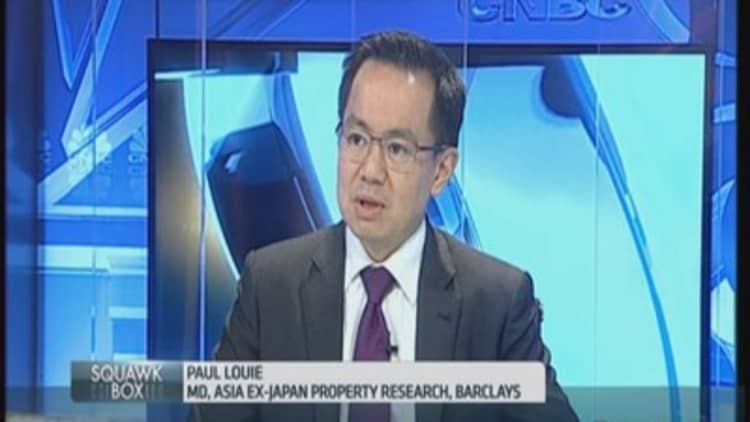Despite slumping prices and mounting inventories, Chinese developers are turning more optimistic on their business prospects for the coming months, according to a new survey.
Over 70 percent of developers polled expect home sales to rise in the first-half of 2015 – a significant improvement from the last time they were polled in May 2014, when 50 percent expected sales to decline in the second half of 2014.
The survey conducted by Barclays polled 14 developers during the second week of January.
"Developers generally anticipate a better mortgage environment with easy access to construction loans," Alvin Wong, analyst at Barclays wrote in note accompanying the survey.
"Although most developers have yet to set their full-year sales targets, most of them guide to 5-10 percent y/y sales growth in 2015 and put inventory clear-up as top priority," he said.

As for home prices, 36 percent of developers expect an increase in the first-half, while the remainder expects prices to remain flat. In the last survey, 75 percent had expected prices to decline during the second half of 2014.
"About 40 percent of the participants are ready to raise the selling prices by around 0-10 percent and expect to see some improvement in 2015 contracted sales margins vs. 2014," Wong said.
Mixed picture
China's latest property price and sales data painted a mixed picture of the housing market: new home prices slumped in December as volumes surged.
Read More Bad news from China won't derail this sector
December's new home prices declined an average 4.3 percent year-on-year in 68 of the 70 major cities it monitors, according to National Bureau of Statistics (NBS) data. This marks the biggest drop since the current data series began in 2011, according to the Financial Times.
In the same month, property sales volumes in 70 major cities rose to the highest level seen in 2014, up nearly 9 percent from November, suggesting that the Beijing's efforts to rescue the flagging market are bearing fruit.
In September, authorities granted a broader range of home buyers access to lower down payments and mortgage rates. Two months later, the central bank cut its benchmark lending rate by 40 basis points to 5.6 percent, its first such move in two years.
Sector risks
A deep downturn in the property sector is widely cited as the biggest risk for the Chinese economy, because it accounts for roughly 15 percent of gross domestic product and directly affects dozens of other sectors from steel to construction.

While the slowdown has been relatively well managed, Shenzhen-based developer Kaisa Group Holdings' failure to pay coupons for its dollar bond maturing in 2020 earlier this month - after government officials blocked sales of some of its projects and several executives unexpectedly left their positions- fueled fresh concerns about the outlook for the property sector.
However, some analysts believe the significance for the sector may be over-amplified.
"Kaisa, as one of the fastest-growth names, has a higher debt exposure, particularly to the offshore market, as well as a concentrated focus on Shenzhen and redevelopment projects, all of which made it vulnerable," Oscar Choi, analyst at Citi wrote in a note.
"Thus, while no one can rule out the possibility of more potential cases being reported, the impact may not be as severe as Kaisa, and its particular case may be less significant for the broader sector," he said.
Buying opportunity?
Meanwhile, Wong of Barclays believes the current negative sentiment around property stocks presents an interesting buying opportunity.
"While the recent concerns over bankruptcy and corruption do adversely affect the overall sector's performance, we believe the impact to be temporary and, thus, provide another potential investment opportunity," Wong said.
"On the fundamental front, we continue to see gradual improvement in the housing supply/demand dynamic and we expect to see the first y/y increase in national property sales in January 2015," he added, highlighting Hong Kong-listed China Resources Land, Guangzhou R&F and KWG Property Holding as preferred companies.


